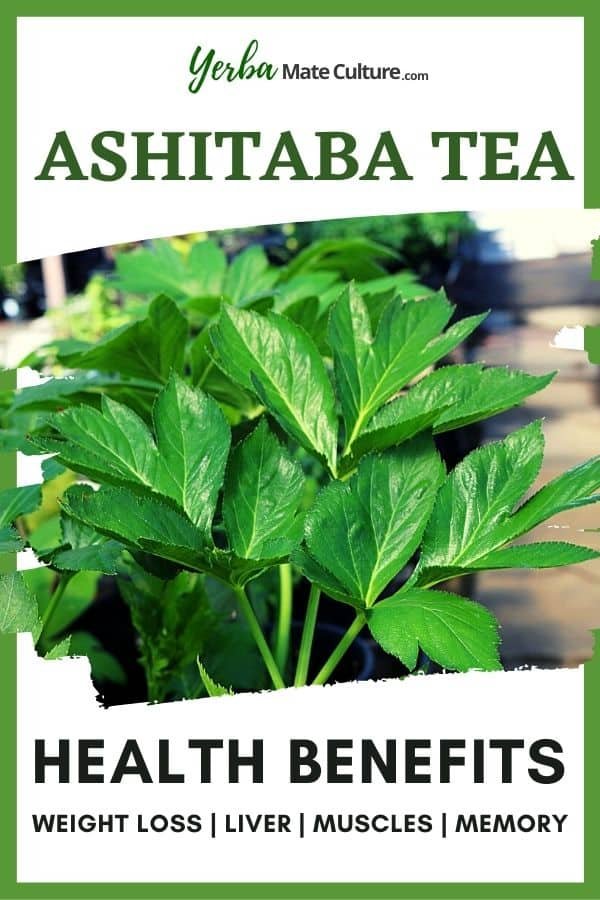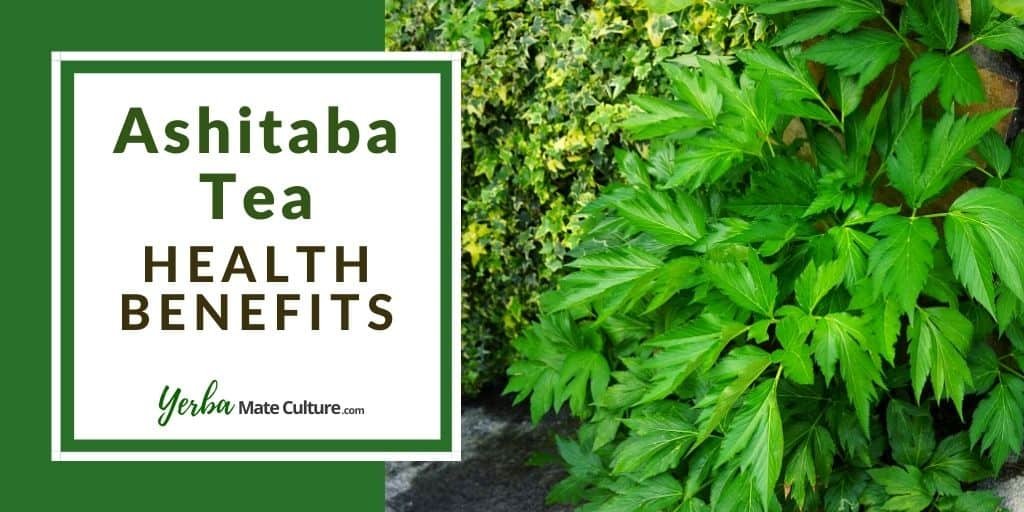Drinking herbal teas is a way of life in many cultures, particularly in India, China, and Japan. Ashitaba is one of the many plants that has been consumed for hundreds of years by the Japanese for medicinal purposes.
In fact, the Japanese have long praised the health benefits of ashitaba tea for many reasons including the ability to help them appear youthful.
Widening knowledge of the plant’s benefits has increased the demand for ashitaba herbal teas and supplements around the world.
Continue reading to learn more about this herb’s history of medicinal use and health benefits backed by scientific research.
Ashitaba Plant
Ashitaba (Angelica keiskei Koidzumi) is a large, fast-growing plant that is native to the coastal areas of Honshu, Japan. The name literally means “tomorrow’s leaf.”
The plant, also called “wild celery,” is a member of the carrot plant family and grows in abundance. If you slice the stem today, it oozes a yellowish sap and a brand new leaf appears tomorrow.
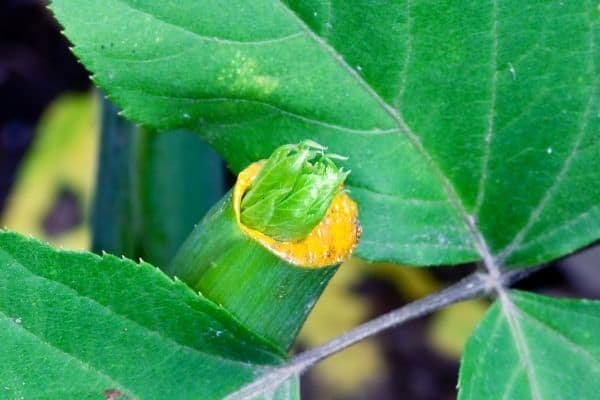
Ashitaba grows to a height of about 18 inches to 4 feet tall and 3 feet wide. The leaves are dark green and glossy.
The plant’s leaves, stems, and sap contain a rich concentration of nutrients and compounds that are thought to be good for cell regeneration and prolonging life similar to the way the plant quickly regenerates its leaves.
History of Medical Use
Ashitaba leaves, stems, and roots are used as botanical medicine in Japan because of their healing powers and quick regenerative abilities.
Tea brewed from the plant parts and powder from the sap are widely consumed as a tonic, diuretic, and laxative. The tea also functions as a natural remedy for high blood pressure, obesity, infections, chronic hepatitis, and stimulating appetite.
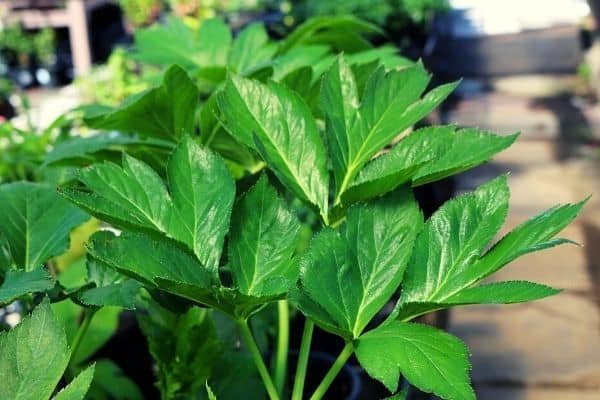
The plant contains various bioactive components including the active ingredient chalcones (mainly the antioxidants 4-Hydroxyderricin and xanthoangelol), linear and angular coumarins, and flavanones.
Studies on ashitaba indicate that the herb possesses anti-inflammatory, antimicrobial, cytotoxic, antihypertensive, and antidiabetic properties. It also shows anti-cancer, hepatoprotective, antiproliferative, and chemopreventive activities.
One outstanding potential benefit of chalcones is its ability to prevent metabolic syndrome.
Ashitaba Tea Benefits
Ashitaba tea health benefits are wide-ranging. Ask the Japanese, and they will list the healing power of Tomorrow’s Leaf.
Scientists and researchers suggest it has protective abilities as well as therapeutic effects on the following conditions:
1. Weight Loss and Visceral Fat
Weight gain with visceral fat (fat around the waist) is one of a cluster of conditions that occur together with high blood sugar, high bold pressure, and high cholesterol in people diagnosed with metabolic syndrome. These conditions are also risk factors for cardiovascular disease (CVD).
One study suggests that ashitaba is a natural way to treat metabolic syndrome (MetS) because of its positive effects on blood glucose and fat burn in the abdominal area. The results of another study show a significant decrease in visceral fat, body fat, body weight, and body mass index (BMI) in participants who ingested ashitaba green juice for 8 weeks.
You can find more herbal teas for weight loss in this guide.
2. Prevents Muscle Atrophy
Muscle atrophy is the natural wearing away of muscle tissue leading to decreased muscle strength. Aging is a common cause of atrophy due to decreased protein production and loss of muscle protein. Other common causes include lack of physical activity, injury, excessive drinking, malnutrition, and long-term use of corticosteroid.
Exercise, dietary changes, and physical therapy are non-invasive treatments for muscle atrophy.
With respect to nutrition, scientists suggest that the chalcone in ashitaba called 4-hydroxyderricin can improve muscle strength. The chemical compound is thought to work by reducing loss of muscle protein. The protective effects of Angelica keiskei Koidzumi (AK) extract and 4-HD against muscle atrophy were tested on both animal and human cells. Researchers concluded that chalcones suppressed muscle mass wasting caused by dexamethasone medication.
3. Protects DNA
Smoking is a risk factor of lymphocytic DNA damage which increases the chance of developing certain diseases including lung cancer.
A 2004 study explored the DNA protective benefits of Angelica keiskei based juice in smokers. Twenty smokers in the study were given the juice to drink daily for 8 weeks. Based on the findings, the plant can protect against cancer by decreasing oxidative DNA damage in humans brought on by chemotherapy.
The prevention of DNA damage is due to the protective abilities of a chalcone known as 2HMC. This was determined in a scientific experiment on whether 2HMC can prevent DNA damage resulting from chemotherapy. As such, 2HMC may be a promising compound in the future development of chemopreventive agents.
4. Liver Protection (from Alcohol)
Earlier on, I mentioned the hepatoprotective profile of Tomorrow’s Leaf. This is particularly good news for individuals at risk of alcohol-induced liver disease as seen in heavy or excessive alcoholic drinkers. Long-term alcohol drinking can lead to hepatitis and cirrhosis of the liver.
Apparently, the antioxidant and anti-inflammatory activities of the extracts of Angelica keiskei Koidzumi (AKE) can protect the liver from oxidative stress that leads to alcoholic liver disease. In a clinical trial, 82 habitual alcohol drinkers were given ashitaba extract for 12 weeks. There was a noticeable improvement in liver function which suggests that heavy drinkers may benefit from AKE supplementation.
5. Blood Pressure
High blood pressure (hypertension) is another one of the conditions associated with metabolic syndrome. Ashitaba’s biochemical profile suggests that it may have positive effects on MetS. What’s more, the plant may reduce high blood pressure.
Angiotensin I-converting enzyme (ACE) plays an important role in blood pressure regulation. Research findings published in A Review of the Medicinal Uses and Pharmacology of Ashitaba explained that a compound isolated from ashitaba leaf tissue inhibits ACE on animals.
Further, ashitaba extract may be an effective alternative to nifedipine for reducing blood pressure in mothers with hypertension shortly after giving birth. This is according to a 2020 study on Angelica keiskei extract on reducing systolic blood pressure among hypertensive postpartum mothers.
6. Prevents Memory Loss
Memory loss is linked to the natural process of aging. What you may not know is angelica keiskei (AK) has anti-amnesic effects that may help prevent memory loss including in people living with Alzheimer’s disease (AD).
Alzheimer’s is a neurodegenerative disorder that leads to memory loss, trouble thinking, and difficulty learning new things. Doctors suspect a brain protein fragment called beta-amyloid is the chief culprit, as it accumulates and causes amyloid plaques seen on the brain of people diagnosed with AD.
A 2013 study assessed ashitaba’s effects on memory impairment caused by scopolamine, a medication used to treat nausea and vomiting. The results showed ashitaba might help prevent memory loss and learning difficulties linked to AD and aging. A more recent study concluded that the plant’s free radical scavenging activities can protect against memory deficits caused by beta-amyloid.
If you are interested in using herbal remedies for protecting your brain, check out this guide with the best teas for brain health.
7. Improves Cholesterol Levels
Obesity, genetics, and eating foods rich in trans fat are common causes of high cholesterol levels. A fatty diet also increases the risk of Non-Alcoholic Fatty Liver (NAFLD). Exercise, a heart-healthy diet, and medication are great ways to manage cholesterol in the blood and liver.
Those wishing to avoid the side effects of drug therapy for elevated cholesterol can consider using ashitaba tea or supplements instead. Apparently, the intake of Tomorrow’s Leaf and its processed products trigger antioxidant activities that reduce cholesterol levels in the liver.
Research findings also suggest that daily intake of ashitaba juice can prevent NAFLD caused by a high-fat diet. It does so by offsetting lipid absorption in the intestine and oxidative stress on the liver.
8. Reduces Inflammation
The immune system is tasked with producing inflammation to fight off infections and diseases caused by bacteria and other microorganisms. However, increased inflammation response by the body can also adversely affect the body.
Angelica keiskei (AK) has been shown to exhibit anti-inflammatory activities that suppress inflammation production. One study looked at the effects of ashitaba supplementation on gastric inflammation caused by Helicobacter pylori (H. pylori). The results indicate that ashitaba inhibits inflammation in the lining of the stomach.
9. Enhances Digestion
There is a famous saying in Japan that “Ashitaba is a stomach medicine” because the vegetable helps relieve heartburn from gastroesophageal reflux disease (GERD), stomach ulcers, and aids digestion. All thanks to its rich fiber content.
The herb is also used as a natural remedy for constipation, cleaning the digestive canal, and reducing the absorption of bile acid.
One study supports the claim that it may enhance digestion. According to the researchers, a large intake of ashitaba products may provide dietary fiber that helps improve the gastrointestinal conditions by stimulating the excretion of waste matter high in bile acids.
Does Ashitaba Have Any Side Effects?
Ashitaba research is limited, but no adverse effects have been observed.
While research suggests potential therapeutic benefits of using it as a food or supplement, there is still not enough evidence to conclude whether it is safe for long-term consumption. It may also be harmful to pregnant or breastfeeding women.
How to Make Ashitaba Tea
Now that you know about all the health benefits of this plant you are probably itching to try some herbal tea made of tomorrow’s leaf.
How Does it Taste?
This herbal tea has a flavor similar to green tea with a hint of celery, but it does not contain caffeine.
You can make ashitaba tea from fresh or dried parts of the plant.
Here is how to prepare a cup of healthy ashitaba tea:
- Step 1: Bring 1 cup of water to the boil
- Step 2: Place 2 tablespoons of chopped fresh plant leaves, stems, or flowers into your favorite teacup. Alternatively, use 1 teaspoon of crushed dry leaves.
- Step 3: Pour the boiling water into the cup and let the herb steep for five to 10 minutes.
- Step 4: Sip and enjoy at a temperature you can tolerate.
Where to Buy Ashitaba Tea
Below are the best ashitaba tea products available as a powder or in tea bags:
- Kenkō Raw Ashitaba Tea: Grown in southern Japan and produced with patented low-heat processing technique, this is probably the best ashitaba tea you can find.
- Percent Ashitaba Tea Bags: If you prefer tea bags, then this naturally grown, pesticide-free, and slightly roasted ashitaba tea is a great option.
Grow Your Own Plants
One great option is to grow your own ashitaba. Just find some seeds or seedlings and start growing it in your garden, balcony, or indoors!
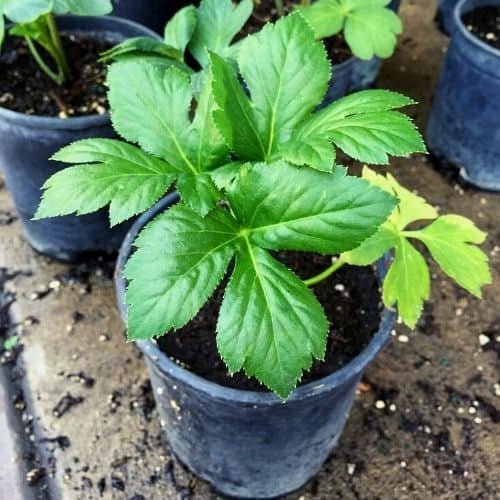
You can even order a small ashitaba plant from Amazon and start growing it:
After growing your plant for a while you can take seedlings to grow more plants.
If you don’t want to mess around with soil, get a hydroponic indoor growing kit to make things smooth and easy. You can also use a food dehydrator to dry your ashitaba and store it for later.
Cooking Tip
In addition to making tea, you can also use the leaves in salads and soups.
Ashitaba Supplements
If you prefer to take your ashitaba as a supplement, there are a couple of excellent products available on Amazon:
- Samsara Herbs Ashitaba Extract Powder: High-grade 20:1 extract available in 2, 4, 8, and 16 ounce pouches. Just mix with water (or juice) and enjoy it!
- Swanson Ashitaba Capsules: These capsules allow you to enjoy the health benefits of ashitaba without tasting the herb. Very convenient to carry around wherever you go.
The Benefits of Tomorrow’s Leaf in a Cup of Tea
People often turn to medicinal plants, such as ashitaba, to avoid the side effects of pharmaceutical drugs. The plant has an impressive medicinal profile featuring the scavenging antioxidants chalcones which may fight disease, obesity, high cholesterol, and keep you looking young.
While results from the limited research seem promising for ashitaba as an alternative to medication, more studies are needed to understand its full effects on humans. As with other herbal supplements, you can consult your doctor before adding ashitaba tea or supplement to your diet to make sure it is suitable for you.
Enjoy your healthy Ashitaba Tea!
-Joonas
PS. Here is another article that you might find interesting: Mamaki Tea Health Benefits
Pin this for later: |
